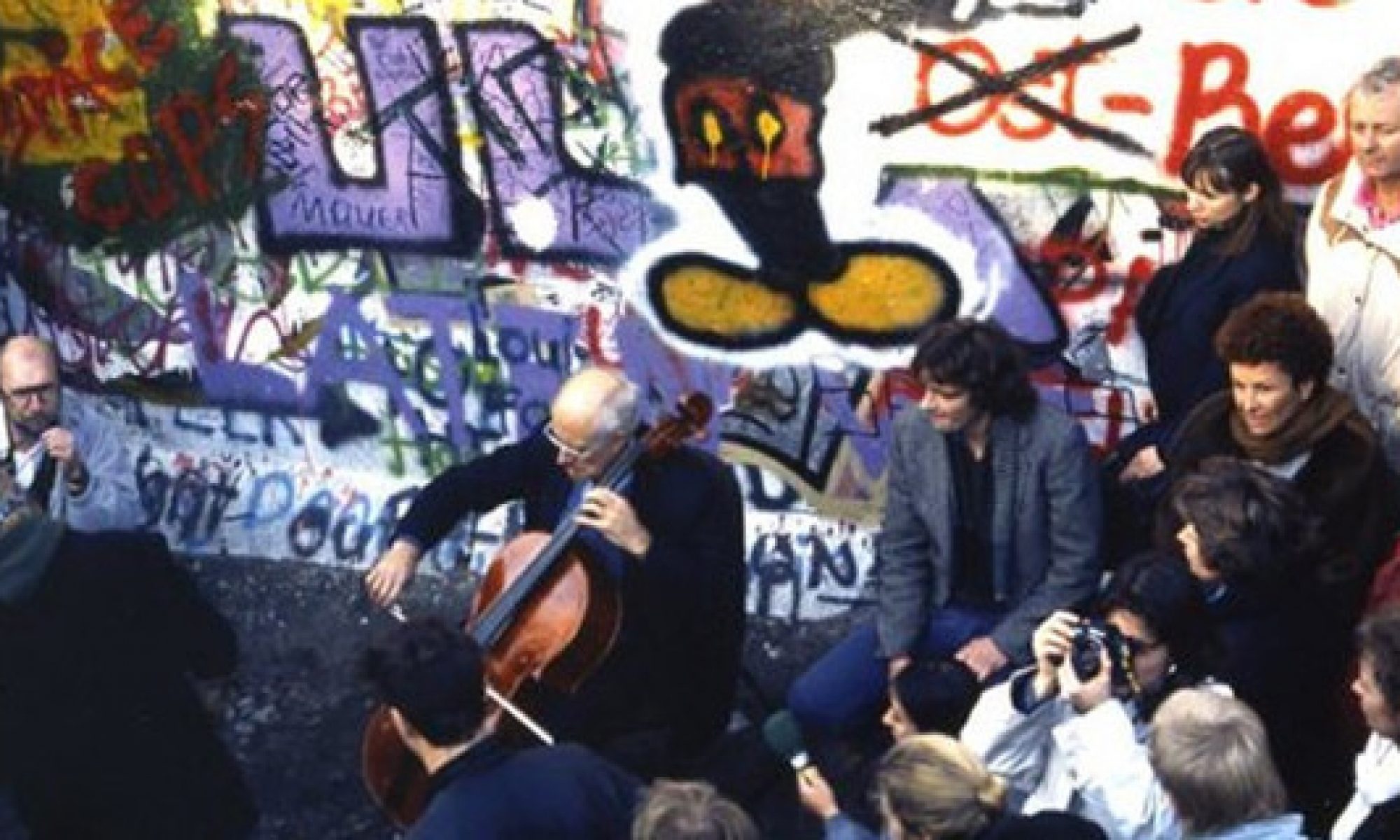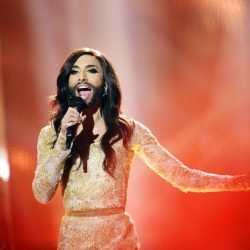The production of musical pieces during the Stalin era was highly regulated. Pieces which reflected strong Soviet values were the ones which were approved by the censor. A thaw period ensued after the death of Stalin in 1953 where much of the nations censors and suppression eased. However, Soviet conservatory curriculums were terribly behind and lacking due to the suppression. Edison Denisov and Alfred Schnittke, cornerstone products of these post-Stalin conservatories, lambasted the lack of influential, early 20th century pieces in their studies. It is by no coincidence that their works were barely tolerated in the Soviet Union, being labelled as avant-garde and formalist. While they wished music was apolitical, they often had to speak publicly about the condition of contemporary Soviet music. This made them a kind of spokesperson for the condition of Soviet music. The repression of the Soviet conservatories created artists which pressed against traditional Soviet beliefs.
The Soviet music filter affected conservatories, thus affecting its pupils. Young musical talents studied at conservatories either by recommendation or pure compositional knowledge. Composers which attended these conservatories in the post-Stalin period are regarded as the younger, second-wave, “thaw” generation of Soviet composers. Although a late-bloomer into the compositional world, composers which Edison Denisov became “passionately involved” with were that of Glinka, Stravinsky, and Shostakovich.[1] The latter being immensely influential on the entirety of the younger second generation of Soviet composers. During his time at the Moscow Conservatory, Denisov recalls the lack of new music exposed to him. “During his [Denisov] student years at the Conservatoire even the music of Debussy was forbidden, no one there dared speak of the Viennese, and he had never so much as heard of Bartok until he made the discovery for himself in 1958 or so.”[2] The new generation struggled with Shostakovich’s legacy, even large names such as Alfred Shnittke and Edison Denisov created pieces in his tribute.[3] Being denounced by Stalin, but whose works ultimately survived to be heard in the Soviet Union and even became the embodiment of socialism, it is obvious as to why these young composers idolized him: “His [Shostakovich’s] official status allowed him to intervene on their [the Thaw generation] behalf on numerous occasions, and his stylistic language had become in many respects the lingua franca of the Soviet state. As Boris Schwarz wrote in 1981, ‘The entire edifice of Soviet music would collapse if Shostakovich’s contributions were removed.’”[4] Being exposed to little other 20th century composers, the thaw generation knew only what they were told, thus having a dramatic effect on their music and perceptions of the Soviet Union.
[1] Susan Bradshaw. “The Music of Edison Denisov.” Tempo, New Series, no. 151 (1984): 3.
[2] Ibid.
[3] Peter J. Schmelz, “What Was ‘Shostakovich,’ and What Came Next?” The Journal of Musicology 24, no. 3 (2007): 338.
[4] Ibid., 298.
Edison Denisov and Alfred Schnittke both criticized their time studying in conservatories. In 1961, the same year which he graduated from the Moscow Conservatory, Schnittke wrote an article in Soviet Music magazine: “This has to do with the fact that functional harmonics (and this is almost the only one taught at the conservatory) lags behind creative practice by fifty or sixty years.” The problem was that [composers] from the early twentieth century never made their way into the Soviet curriculum: ‘Apparently the time has come to set up a new part of this science that reflects the development of harmony in the music of our century; I am talking, of course, of music that is worthy of its name.’”[5] This kind of criticism was only possible due to leaders now accepting some criticism where its due, and that Nikita Khrushchev called for the Soviet Union to “catch up with and then surpass the United States and the West within twenty years.”[6] This kind of rapid development is not possible without vocal criticism of the nation’s inadequacies. Lack of such influential and Russian figures in the study of music composition shortened the already tiny list of Soviet composer idols. Thus, many young thaw generation composers idolized Shostakovich early on, and began a paradoxical relationship with him, struggling to timely free themselves from his influence. Denisov graduated from the Moscow Conservatory a handful of years before Alfred Schnittke enrolled, and the Shostakovich influence still can be heard in Denisov’s work: “The works of the early 1960’s touchingly reveal their indebtedness to both Prokoviev and Shostakovich (particularly the latter) even when, as in the Variations for piano (1961), the language is a 12-tone one.”[7] These avant-garde artists found their unique sound and style later in their careers but Shostakovich was an obvious influence early on.
[5] Boris Belge. “From Peace to Freedom: How Classical Music Became Political in the Soviet Union, 1964–1982.” Ab Imperio, no. 2 (2013): 290.
[6] Ibid., 291.
[7] Bradshaw, “The Music of Edison Denisov,” 3.
The lack of proper music education stunted the ability of thaw generation composers to initially create original Soviet music. It also brewed negative feelings towards the communist government in general. As seen from Schnittke, Arvo Part, and a plethora of other “nonconformist” Soviet composers, religion was prominent in their works, with over 100 being released during this period.[8] It is ironic because religion and the communist Soviet Union do not agree at all – atheism was rooted in its society, its citizens being unable to practice religion for some time: “Schnittke explained this ‘spiritual awakening’ in these words: ‘Our current fascination with what we were deprived of for decades is the fascination people feel for what they have been starved of.”[9] This represents a larger trend in Soviet culture, which is the loss of faith in the communist government. In the early 1980’s, “Soviet leaders insisted on maintaining the status quo even as they gradually realized that (in historian Ronald Suny’s words) ‘pressure for greater social autonomy and less interference from the state was building up.’”[10] Resistance to the conformist communist culture was a trend seen not only in Soviet avant-garde music, but the society as a whole.
[8] Ivana Medić, “I Believe… in What? Arvo Pärt’s and Alfred Schnittke’s Polystylistic Credos.” Slavonica 16 (2) (2010): 96.
[9] Medić, “I Believe… in What? Arvo Pärt’s and Alfred Schnittke’s Polystylistic Credos,” 97.
[10] Schmelz, “What Was ‘Shostakovich,’ and What Came Next?,” 332.
The suppression of the Soviet conservatories created artists which pressed against traditional Soviet beliefs. Not only was it just artists, but the Soviet intelligentsia had a growing disdain for the communist status-quo. Dmitri Shostakovich was a gargantuan figure in Soviet music and greatly influenced the younger thaw generation, so much so that Shostakovich’s musical styles can be heard in these younger artists. Suppression was great within the conservatories and pupils were not exposed vast swaths of earlier Russian works. Nikita Kruchshev wished to surpass the West in terms of musicality and art, and such a goal was not attainable without the criticism of the existing structure. Religion was a prominent feature of thaw generation works which was in direct contrast with the atheist beliefs of the uncertain Soviet regime. It can be said that of Soviet avant-garde (or nonconformist) composers, the very conservatories which attempted to shaped their musical minds, only created skepticism of the existing communist regime. This kind of attitude was common among Soviet intelligentsia and reflected a growing concern of the stability and longevity of the Soviet Union.
Bibliography
Belge, Boris. 2013. “From Peace to Freedom: How Classical Music Became Political in the Soviet Union, 1964–1982.” Ab Imperio, no. 2 (April): 279–97. doi:10.1353/imp.2013.0056.
Bradshaw, Susan. “The Music of Edison Denisov.” Tempo, New Series, no. 151 (1984): 2-9.
Denisov, Edison. “Edison Denisov (1929–96).” In Three Questions for Sixty-Five Composers, by Varga Bálint András, 59-62. Boydell and Brewer, 2011.
Medić, Ivana. 2010. “I Believe… in What? Arvo Pärt’s and Alfred Schnittke’s Polystylistic Credos.” Slavonica 16 (2): 96–111. doi:10.1179/136174210X12814458213727.
Schmelz, Peter J. “What Was ‘Shostakovich,’ and What Came Next?” The Journal of Musicology 24, no. 3 (2007): 297-338. doi:10.1525/jm.2007.24.3.297.
Pegassumus, “Edison Denisov – DSCH,” YouTube video, 6:30, January 15, 2015, https://www.youtube.com/watch?v=ZwA5P7_rSp4.

